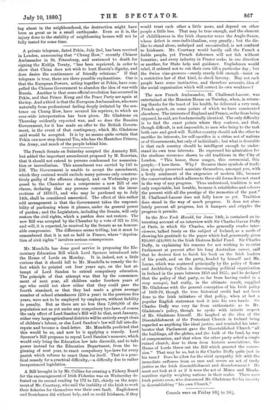Mr. Mundella has done good service in proposing the Ele-
mentary Education Bill which Lord Spencer introduced into the House of Lords on Monday. It is, indeed, not a little curious that it should fall to Mr. Mundella to remedy the de- fect which he pointed out four years ago, on the last at- tempt of Lord Sandon to extend compulsory education. The principle of that attempt was that by the commence- ment of next year, all children under fourteen years of age who could not show either that they could pass the fourth standard, or that they had made a given average number of school attendances (250 a year) in the previous five years, were not to be employed by employers, without liability to penalty. But as there are no less than 7,000,000 of the population not as yet under any compulsory bye-laws, of course the only effect of Lord Sandon's Bill will be that, next January, either very large agricultural districts will be entirely swept clean of children's labour, or else Lord Sandon's law will fall into dis- repute and become a dead-letter. Mr. Mundella predicted that this would be so, and now he is applying a remedy. Lord Spencer's Bill proposes to repeal Lord Sandon's measure, which would only bring the Education law into discredit, and to take power instead for the Education Department, from the be- ginning of next year, to enact compulsory bye-laws for every parish which refuses to enact them for itself. That is a prac- tical remedy for a practical difficulty,—a difficulty due to rather inexperienced legislation.


































 Previous page
Previous page